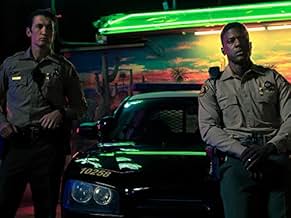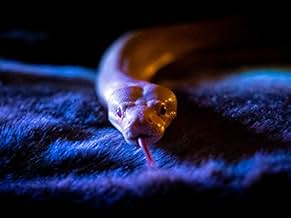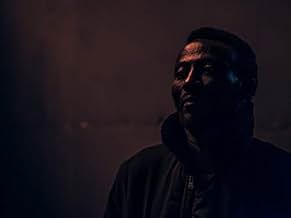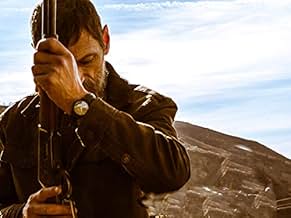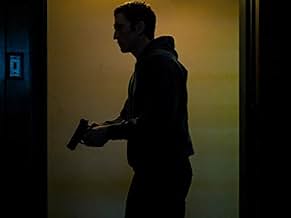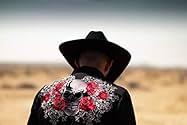Explore le monde criminel de Los Angeles en suivant les chemins existentiels des personnages, des tueurs aux samouraïs.Explore le monde criminel de Los Angeles en suivant les chemins existentiels des personnages, des tueurs aux samouraïs.Explore le monde criminel de Los Angeles en suivant les chemins existentiels des personnages, des tueurs aux samouraïs.
Parcourir les épisodes
Résumé
Reviewers say 'Too Old to Die Young' presents Nicolas Winding Refn's distinct style with slow pacing, neon visuals, and a dark atmosphere. The series blends crime drama with surreal elements, using minimalist dialogue and long takes. Its unconventional storytelling and aesthetic beauty are praised, though the slow pace and non-linear plot divide opinions. The show delves into violence, existentialism, and the human condition with dark humor and satire, making it a unique yet polarizing experience.
Avis à la une
I love Nicolas Winding Refn. Drive is one of my all time favorite movies, and I loved the Neon Demon and Bronson. So I was going into this show optimistic and excited, but towards the end of the first episode it felt like a 10 hour movie. There's a lot of amazing shots but the pacing is very Very slow, and it bored me out a lot. The show can be really great if the pacing was a bit better. I love the directing, music, style and the acting in the episode. Story isn't really that interesting. but like I said, the biggest flaw is the pacing. I couldn't continue watching anymore.
Gripping, suspenseful, cinematography-filled utopia of a highly graphic, disturbing, sickening, and sometimes s/xual nature, violence, pe/ophilia, r/pe, misogyny, panning shots, long shots, and longer-than-normal pauses in-between dialogue in a disturbing and sickening world. This is peak entertainment, and possibly peak television.
Those who gave up watching it minutes into the premiere or in general and those who streaked through it that then spewed out negativity at it are missing out and maybe don't have the ability to appreciate what is truly good, what is good entertainment and television, and this masterpiece of a very long movie disguised as a show fits within that category.
This has been one hell of a treat, courtesy of Nicolas Winding Refn, one we didn't deserve but appreciate very much, those that recognize and acknowledge real entertainment. I feel sorry for those who don't feel the same way, and I feel all the more sorry for those that hate it. I have enjoyed it so much over the last week and a day, and now I feel empty inside. What a ride-filled experience, wow.
Do me one favor. Watch this masterpiece. It'll seem and feel very slow, especially when you're getting into it, and it is, but entertainment isn't limited to fast, action-filled pacing. You may end up feeling ecstatic and thankful that you did. I know I am. I wish I could watch this all over again for the first time but with a more mature, open mind. That would make for an even better experience.
Those who gave up watching it minutes into the premiere or in general and those who streaked through it that then spewed out negativity at it are missing out and maybe don't have the ability to appreciate what is truly good, what is good entertainment and television, and this masterpiece of a very long movie disguised as a show fits within that category.
This has been one hell of a treat, courtesy of Nicolas Winding Refn, one we didn't deserve but appreciate very much, those that recognize and acknowledge real entertainment. I feel sorry for those who don't feel the same way, and I feel all the more sorry for those that hate it. I have enjoyed it so much over the last week and a day, and now I feel empty inside. What a ride-filled experience, wow.
Do me one favor. Watch this masterpiece. It'll seem and feel very slow, especially when you're getting into it, and it is, but entertainment isn't limited to fast, action-filled pacing. You may end up feeling ecstatic and thankful that you did. I know I am. I wish I could watch this all over again for the first time but with a more mature, open mind. That would make for an even better experience.
Created by Nicolas Winding Refn and Ed Brubaker, and directed by Refn, Too Old To Die Young is the definition of "not for everyone". This is Refn sans restrictions, representing the purest yet expression of his aesthetic sensibilities and thematic concerns. If you thought Only God Forgives (2013) was slow, all style and no substance, and pretentiously self-indulgent, then TOTDY is not for you, simple as that. Running for 13 hours across the course of 10 episodes, Refn regards it as "a 13-hour movie" and insists that it is not a television show. Either way, I loved it. The aesthetic is exceptional, the quirks are pure surrealism, the humour is spot on, the violence (particularly the sexual violence) is sudden and barbaric, but never gratuitous or pointless, and the themes are fascinating. This isn't going to turn a single person into a Refn fan. Indeed, it will probably alienate some of his more casual fans, as it tests the limits of what even the most artistically open-minded viewer will watch on their television screens. That said, if you're on-board with it, you're in for an unforgettable ride.
Martin Jones (Miles Teller) and his partner Larry (Lance Gross) are two uniformed LA cops on patrol. After sexually harassing and extorting a young woman because he can, Larry is taking a selfie for his mistress, when Jesus Rojas (an exceptional Augusto Aguilera) shoots him in the back of the head. And from that opening scene springs the story, which introduces us to local crime boss Damian (Babs Olusanmokun), Martin's 18-year-old girlfriend Janey (Nell Tiger Free), her billionaire father Theo (a completely insane William Baldwin), former FBI agent Viggo Larsen (John Hawkes), his associate Diana (Jena Malone), and Yaritza (a stunning, scene-stealing Cristina Rodlo), a young woman with a penchant for sexual domination who claims to be the High Priestess of Death.
If this makes the show sound like a densely plotted neo-noir, then let me put that notion to bed right now - make no mistake, in TOTDY, the plot comes a long way behind such things as tone, imagery, mood, and atmosphere.
The most obvious aesthetic elements are the cinematography by Darius Khondji and Diego García and the editing by Refn's regular cutter, Matthew Newman. The first episode, and several of the later episodes, are bathed in neon, with vibrant reds, purples, oranges, blues, and greens saturating the screen. The second episode then is set in Mexico and is a complete contrast to the first, almost over-exposed, with whites popping and bleeding into any nearby blacks.
Additionally, every shot feels deliberate, meticulously composed, important, like every element of the composition is saying something of significance; for example, whether the camera moves or not offers a commentary on the content of the scene. Every item within the frame feels necessary, intentional, and by design. And scenes go on for a loooooong time; most run at least two beats beyond where the natural end would seem to be, with long silences and languidly-paced, emotionlessly delivered dialogue. This all creates a sense of extreme awkwardness that makes the viewer restless and uncomfortable, which, of course, is precisely the point.
This lethargic sense is helped immensely by the editing, which is almost imperceptible. It feels like the show was edited before it was shot; every cut feels measured, happening where it does because that's the only place it could happen. I'd be shocked to learn that a lot of coverage was shot to be assembled in the editing room later; it's too tight for that. The edit must have been planned out from the get-go. Coupled with this, the sound design by Paul Hackner is unique. For interiors, there is often no ambient room noise and because there are such long pauses in the dialogue, the silence is oppressive. It has the effect of suggesting the characters aren't in the room, making it feel almost ethereal and hypnotic, and it turns conversations that are already slow and full of silence into something even more distinctive.
And what is all of this in service of? What is Refn saying? The main theme is very straightforward - toxic masculinity and the commodification of the female, in particular the sexual commodification. TOTDY is a show wherein many of the female characters are looked upon by men as objects to be used rather than as people with their own agency. In one particular scene, a porn director washes down a young woman with a hose, the way one might wash down a horse after a race. When the show begins, it seems to commit the same sin, as none of the females have much in the way of vibrancy, and all are defined based upon their relationships with men. It's only as the series moves on, and the characters of Diana, Janey, and Yaritza assume centre stage that we realise the method in Refn's madness - despite how it begins, this isn't a show about men. Paedophiles, racists, violent misogynists, amoral murderers, people traffickers, even a father who unashamedly hints at incest - Refn and Brubaker have assembled quite a collective of male bottom feeders to pitch against the female characters. Never has the phrase "the evil that men do" been more appropriate.
Another issue looked at includes the notion that America is a dying empire, unaware of its own imminent demise. When this happens, it will return to what it was born from - violence, and only the few who were prescient to the collapse will be able to protect the weak and the innocent. This is laid out fairly explicitly in an astonishing monologue from Viggo which taps into some of the tenets of post-Darwinian French decadence, whereby industrialisation was often linked to notions of the fin de siècle and the theory that humanity was more likely to devolve than evolve. In TOTDY, Refn presents humanity as at a transitory moment right before a cataclysmic shift. Technology has overtaken morality; civilization has pushed itself to the point of self-consumption; the individual is insignificant. Viggo thinks about this in terms of society fracturing and collapsing, with humanity no longer at the centre, no longer a part of nature. Diana thinks of it in social and political terms, with the privileged few coming to rule over the many. Jesus thinks about it in more biblical terms where he is an Old Testament-style God punishing those who have wronged him.
All in all, I loved the show. But there's no denying that the very things which some people embrace and celebrate (particularly the pace), will drive others up the wall. And certainly, it's not hard to imagine a hell of a lot of people watching for 20 minutes before hastily changing the channel and deeming the whole enterprise the "worst show ever." Amazon has allowed Refn to indulge in everything that his detractors criticise and his fans laud, and the result is either a travesty or masterpiece, depending on your perspective.
Martin Jones (Miles Teller) and his partner Larry (Lance Gross) are two uniformed LA cops on patrol. After sexually harassing and extorting a young woman because he can, Larry is taking a selfie for his mistress, when Jesus Rojas (an exceptional Augusto Aguilera) shoots him in the back of the head. And from that opening scene springs the story, which introduces us to local crime boss Damian (Babs Olusanmokun), Martin's 18-year-old girlfriend Janey (Nell Tiger Free), her billionaire father Theo (a completely insane William Baldwin), former FBI agent Viggo Larsen (John Hawkes), his associate Diana (Jena Malone), and Yaritza (a stunning, scene-stealing Cristina Rodlo), a young woman with a penchant for sexual domination who claims to be the High Priestess of Death.
If this makes the show sound like a densely plotted neo-noir, then let me put that notion to bed right now - make no mistake, in TOTDY, the plot comes a long way behind such things as tone, imagery, mood, and atmosphere.
The most obvious aesthetic elements are the cinematography by Darius Khondji and Diego García and the editing by Refn's regular cutter, Matthew Newman. The first episode, and several of the later episodes, are bathed in neon, with vibrant reds, purples, oranges, blues, and greens saturating the screen. The second episode then is set in Mexico and is a complete contrast to the first, almost over-exposed, with whites popping and bleeding into any nearby blacks.
Additionally, every shot feels deliberate, meticulously composed, important, like every element of the composition is saying something of significance; for example, whether the camera moves or not offers a commentary on the content of the scene. Every item within the frame feels necessary, intentional, and by design. And scenes go on for a loooooong time; most run at least two beats beyond where the natural end would seem to be, with long silences and languidly-paced, emotionlessly delivered dialogue. This all creates a sense of extreme awkwardness that makes the viewer restless and uncomfortable, which, of course, is precisely the point.
This lethargic sense is helped immensely by the editing, which is almost imperceptible. It feels like the show was edited before it was shot; every cut feels measured, happening where it does because that's the only place it could happen. I'd be shocked to learn that a lot of coverage was shot to be assembled in the editing room later; it's too tight for that. The edit must have been planned out from the get-go. Coupled with this, the sound design by Paul Hackner is unique. For interiors, there is often no ambient room noise and because there are such long pauses in the dialogue, the silence is oppressive. It has the effect of suggesting the characters aren't in the room, making it feel almost ethereal and hypnotic, and it turns conversations that are already slow and full of silence into something even more distinctive.
And what is all of this in service of? What is Refn saying? The main theme is very straightforward - toxic masculinity and the commodification of the female, in particular the sexual commodification. TOTDY is a show wherein many of the female characters are looked upon by men as objects to be used rather than as people with their own agency. In one particular scene, a porn director washes down a young woman with a hose, the way one might wash down a horse after a race. When the show begins, it seems to commit the same sin, as none of the females have much in the way of vibrancy, and all are defined based upon their relationships with men. It's only as the series moves on, and the characters of Diana, Janey, and Yaritza assume centre stage that we realise the method in Refn's madness - despite how it begins, this isn't a show about men. Paedophiles, racists, violent misogynists, amoral murderers, people traffickers, even a father who unashamedly hints at incest - Refn and Brubaker have assembled quite a collective of male bottom feeders to pitch against the female characters. Never has the phrase "the evil that men do" been more appropriate.
Another issue looked at includes the notion that America is a dying empire, unaware of its own imminent demise. When this happens, it will return to what it was born from - violence, and only the few who were prescient to the collapse will be able to protect the weak and the innocent. This is laid out fairly explicitly in an astonishing monologue from Viggo which taps into some of the tenets of post-Darwinian French decadence, whereby industrialisation was often linked to notions of the fin de siècle and the theory that humanity was more likely to devolve than evolve. In TOTDY, Refn presents humanity as at a transitory moment right before a cataclysmic shift. Technology has overtaken morality; civilization has pushed itself to the point of self-consumption; the individual is insignificant. Viggo thinks about this in terms of society fracturing and collapsing, with humanity no longer at the centre, no longer a part of nature. Diana thinks of it in social and political terms, with the privileged few coming to rule over the many. Jesus thinks about it in more biblical terms where he is an Old Testament-style God punishing those who have wronged him.
All in all, I loved the show. But there's no denying that the very things which some people embrace and celebrate (particularly the pace), will drive others up the wall. And certainly, it's not hard to imagine a hell of a lot of people watching for 20 minutes before hastily changing the channel and deeming the whole enterprise the "worst show ever." Amazon has allowed Refn to indulge in everything that his detractors criticise and his fans laud, and the result is either a travesty or masterpiece, depending on your perspective.
We cannot be certain of our true selves for we are not the rational creatures we purport to be. We lie to ourselves constantly. And when we do reveal ourselves - it is often with the suddenness and venom of serpents. At the heart of Too Old to Die Young lies a mandala of irrational selves, where characters are adrift in a vivid dreamlike emptiness that is both conscious and unconscious and "time is a river that flows in both directions."
The characters cannot help but to be molded by the irrational, by choices, accidents, violence and experience. You do not need a brick by brick plot in order to decipher them-for with these characters the mighty stone has already dropped into the river when we meet them - and the rippling gyre is already in motion. This is the genius of Refn. The ripples widen, slow and fade like the pure tone of a Tibetan gong.
The cinematography is bold and saturated; the location and settings and lighting is equal to the characterization. It is beautiful and challenging and violently poetic. If you need to cling to manifestations of order and generalized stereotypes to enjoy a work of art - then this won't appeal to you.
The characters cannot help but to be molded by the irrational, by choices, accidents, violence and experience. You do not need a brick by brick plot in order to decipher them-for with these characters the mighty stone has already dropped into the river when we meet them - and the rippling gyre is already in motion. This is the genius of Refn. The ripples widen, slow and fade like the pure tone of a Tibetan gong.
The cinematography is bold and saturated; the location and settings and lighting is equal to the characterization. It is beautiful and challenging and violently poetic. If you need to cling to manifestations of order and generalized stereotypes to enjoy a work of art - then this won't appeal to you.
One beautiful shot after the other, atmosphere-building silences, sparse dialogue, echoing analog synth drones. If you've seen any of Refn's last 3 films (Drive, Only God Forgives, Neon Demon) then you know the score and you should probably know what to expect coming into this so-called series, which really is much more of a 13-hour movie/bad acid trip.
Except with so much time for Refn to do as he pleases we end up with much more atmosphere-building silent moments, and somehow the dialogue is even sparser - Miles Teller basically plays a corrupt cop version of Ryan Gosling's Driver minus the toothpick. The end result comes across like a non-supernatural, neon-colours David Lynch piece with a mesmerizing score by Cliff Martinez at his best. This alone makes it worth watching - it's like being in an art gallery, watching one beautiful moving painting after another as brilliant, haunting music fades in and out. Is there much underneath this shimmering, beautiful surface? Debatable. Does it matter? Only if you like your TV and movies old school style, with a well-conceived plot and characters you can empathise with.
Except with so much time for Refn to do as he pleases we end up with much more atmosphere-building silent moments, and somehow the dialogue is even sparser - Miles Teller basically plays a corrupt cop version of Ryan Gosling's Driver minus the toothpick. The end result comes across like a non-supernatural, neon-colours David Lynch piece with a mesmerizing score by Cliff Martinez at his best. This alone makes it worth watching - it's like being in an art gallery, watching one beautiful moving painting after another as brilliant, haunting music fades in and out. Is there much underneath this shimmering, beautiful surface? Debatable. Does it matter? Only if you like your TV and movies old school style, with a well-conceived plot and characters you can empathise with.
Le saviez-vous
- AnecdotesWas packaged to the Cannes Film Festival under the title "North of Hollywood, West of Hell."
- GaffesThe show focuses on the Los Angeles County Sheriff's Department. While they do have the ability to make arrests anywhere in the county, they generally do not patrol in the city of Los Angeles (as represented in the story) since it's covered by L.A.P.D. instead. The Sheriff's Department works in unincorporated towns like Altadena and East Los Angeles, incorporated cities that contract with them like Santa Clarita and West Hollywood, and transit agencies like Metrolink and Los Angeles MTA.
- ConnexionsReferenced in Film Junk Podcast: Episode 712: Toy Story 4 (2019)
Meilleurs choix
Connectez-vous pour évaluer et suivre la liste de favoris afin de recevoir des recommandations personnalisées
Détails
- Date de sortie
- Pays d’origine
- Sites officiels
- Langue
- Aussi connu sous le nom de
- Занадто старий, щоб померти молодим
- Société de production
- Voir plus de crédits d'entreprise sur IMDbPro
- Durée1 heure 16 minutes
- Couleur
- Mixage
- Rapport de forme
- 1.85 : 1
Contribuer à cette page
Suggérer une modification ou ajouter du contenu manquant

Lacune principale
What was the official certification given to Too Old to Die Young (2019) in India?
Répondre



